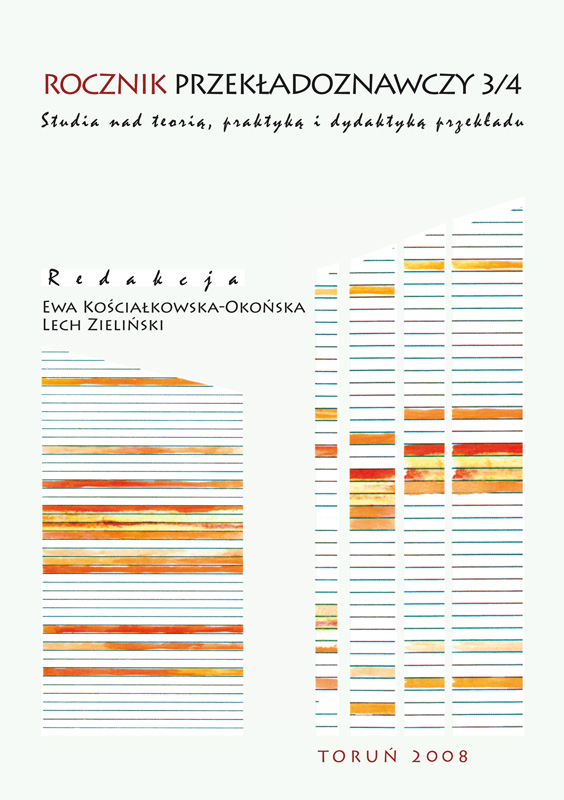The Myth of Acultural Scientifi c Texts as Exemplifi ed by Literature on Psychology
DOI:
https://doi.org/10.12775/RP.2008.009Keywords
intertextuality, translation error, literary, language functionAbstract
The language function is one of the criteria for dividing translated texts into literary and non-literary ones. The latter are supposedly acultural, i.e. free from cultural and intertextual references. Such an approach may lead to translation errors. Translators who focus entirely on that branch of knowledge that a given text refers to and on related terminology may overlook cultural and intertextual elements. Th is not only ignores the intention of introducing them into the text, but also changes the meaning of passages in which they are included. The analysis of two books concerning psychology and psychotherapy: Systems of Psychotherapy. A Transtheoretical Analysis and Personality Disorders in Modern Life provides ample examples of introducing implicit references to the Bible and literary masterpieces into psychological discourse. Despite the label of scientific texts, American psychological literature is characterized by numerous hidden quotations from other sources, thus becoming deeply rooted in the intertextual space, in order to allow readers to imagine psychic conditions described. Consequently, in translating such texts, translators cannot limit themselves to a thorough knowledge of psychology, psychotherapy and terminology connected with those areas, but must also be observant enough to notice intertextual traces and then be able to localize them and interpret them correctly. Otherwise the translation may alter the original meaning or introduce ambiguity which is not welcome in such texts.
This paper analyses selected examples of intertextuality in psychological literature and their translations. In each case, editorial intervention was required since the lack of recognition of such elements or their incorrect interpretation resulted in various types of translation errors. The conclusion off ered from this discussion is that translators must bear in mind that all texts are of a hybrid nature, and a narrow specialized approach may not guarantee an error-free translation.
References
Baker, M. (red.), 2005, Routledge Encyclopedia of Translation Studies, London– New York.
Borowy, W., 1955, „Dawni teoretycy tłumaczeń”, [w:] O sztuce tłumaczenia, Rusinek, M. (red.), Wrocław, s. 23–40.
Carroll, L., 1993, Alice in Wonderland and Th rough the Looking-Glass, Ware.
Carroll, L., 1990, Przygody Alicji w krainie czarów. O tym, co Alicja odkryła po drugiej stronie lustra, tłum. M. Słomczyński, Wrocław.
Dąmbska-Prokop, U. (red.), 2000, Mała encyklopedia przekładoznawstwa, Częstochowa.
Dzierżanowska, H., 1990, Przekład tekstów nieliterackich na przykładzie języka angielskiego, Warszawa.
Ilek, B., 1975, „Granice ścisłości znaczeniowej w tłumaczeniu literatury pięknej”, tłum. M. Erhardt-Gronkowska, [w:] Przekład artystyczny. O Sztuce tłumaczenia. Księga druga, Pollak, S. (red.), Wrocław, s. 99–108.
Ingarden, R., 1955, „O tłumaczeniach”, [w:] O sztuce tłumaczenia, Rusinek, M. (red.), Wrocław, s. 127–192.
Kozłowska, Z., 2003, „Zasada stopniowania trudności przy doborze tekstów do nauczania tłumaczenia pisemnego tekstów nieliterackich”, [w:] Teoria i dydaktyka przekładu, Hejwowski, K. (red.), Olecko, s. 159–176.
Krzeczkowski, H., 1975, „Kilka uwag o odpowiedzialności tłumacza”, [w:] Przekład artystyczny. O Sztuce tłumaczenia. Księga druga, Pollak, S. (red.), Wrocław, s. 139–148.
Lipiński, K., 2000, Vademecum tłumacza, Kraków.
Masson, J., 2004, Przeciw terapii, tłum. B. Gulkowski, Kraków.
Millon, T., Davis, R., 2000, Personality Disorders in Modern Life, New York.
Millon, T., Davis, R., 2005, Zaburzenia osobowości we współczesnym świecie, Warszawa.
Newmark, P., 1988, Approaches to Translation, New York–London.
Ortega y Gasset, J., 1937/2003, „The Misery and Splendor of Translation”, [w:] The Translation Studies Reader, Venuti, L. (red.), London–New York, s. 49–63.
Prochaska, J. O., Norcross. J. C., 2003, Systems of Psychotherapy. A Transtheoretical Analysis, Pacific Grove, CA.
Prochaska, J. O., Norcross, J. C., 2006, Systemy psychoterapeutyczne. Analiza Transteoretyczna, Warszawa.
Pieńkos, J., 1993, Przekład i tłumacz we współczesnym świecie, Warszawa.
Pisarska, A., Tomaszkiewicz, T., 1998, Współczesne tendencje przekładoznawcze, Poznań.
Reiss, K., 1971/2003, „Type, Kind and Individuality of Text. Decision making in translation”, [w:] The Translation Studies Reader, Venuti, L. (red.), London– New York, s. 160–171.
Shakespeare, W., 1991, Hamlet, [w:] William Shakespeare. The Complete Works, Wells, S., Taylor, G. (red.), Oxford.
Shakespeare, W., 1994, Hamlet, tłum. S. Barańczak, Poznań.
Shakespeare, W., 1994, Hamlet, królewicz duński, tłum. J. Paszkowski, Warszawa.
Voellnagel, A., 1973, Jak nie tłumaczyć tekstów technicznych, Warszawa.
„Młot na czarownice” http://www.racjonalista.pl/kk.php/d,104, (dostęp 08.02.2007).
Downloads
Published
Issue
Section
Stats
Number of views and downloads: 1345
Number of citations: 0



